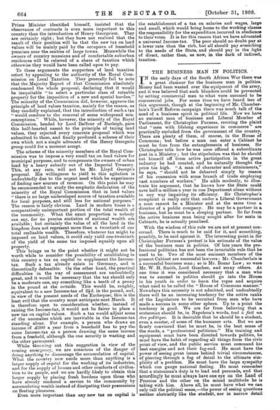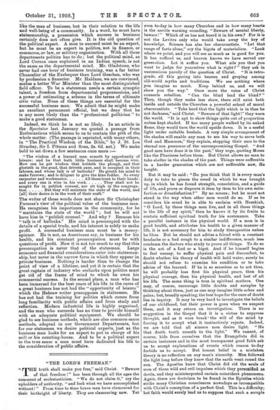THE BUSINESS MAN IN POLITICS. '
IN the early days of the South African War there was a great clamour for the business man in politics. Money had been wasted over the equipment of the army, and it was believed that such blunders could be prevented by setting commercial men to what were assumed to be commercial jobs. For some time we have heard less of this argument, though at the beginning of Mr. Chamber- lain's Tariff Reform campaign there was much talk of the need of a business spirit in political life. Now we have an eminent man of business and Liberal Member of Parliament, Sir Christopher Furness, reviving the plaint that "men with lifelong experience in commerce" are practically excluded from the government of the country. There are plenty of them, of course, in the House of Commons ; but before a man can enter a Cabinet he must be free from the entanglements of business. Sir Christopher tells bow he was once offered a subordinate post in a Ministry ; but the stipulation was that he should cut himself off from active participation in the great industry he had created, and he naturally thought the price too high. "A man of character and attainments," he says, "should not be debarred simply by reason of his connexion with some branch of trade employing vast numbers of workers." He adds modestly, to illus- trate his argument, that he knows how the State could save half-a-million a. year in one Department alone without in any way impairing its efficiency. Sir Christopher's complaint is really only that under a Liberal Government a man cannot be a Minister and at the same time a director of a public company. He may be a partner in a business, but he must be a sleeping partner. So far from the active business man being sought after for seats in Cabinets, he is actually penalised.
With the wisdom of this rule we are not at present con- cerned. There is much to be said for it, and something, possibly, to be said against it. The interesting point in Sir Christopher Furness 's protest is his estimate of the value of the business man in politics. Of late years the pro- fessional politician has not been the invariable rule that he used to be. Two of the most eminent members of the present Cabinet are successful lawyers; Mr. Chamberlain is a successful business man; so is Mr. Bonar Law ; so were Mr. W. H. Smith, Lord Goschen, and many others. At one time it was considered necessary that a man who was to succeed in politics should go into the House in his youth in order to learn the ropes and acquire what used to be called the "House of Commons manner." Nowadays this necessity is not admitted, and undoubtedly there will be an increasing tendency for the active ranks of the Legislature to be recruited from men who have made a success in some other sphere. Up to a point the tendency is good. We are far from believing that a statesman should be, in Napoleon's words, tout a fait un etre politique. It is desirable that he should be a student, even a master, of some of the humauer arts. But we are firmly convinced that he must be, in the best sense of the words, a "professional politician." His training and equipment must have been directed towards politics, he must have the habit of regarding all things from the civic point of view, and the public service must command his best energies and not their fag-end. He must have the power of seeing great issues behind trivial circumstances, of piercing through a fog of detail to the ultimate sim- plicity of a problem. He must have the large sympathy which can gauge national feeling. He must remember that a statesman's duty is to lead and persuade, and that accordingly he must always have one eye on the Land of Promise and the other on the mixed multitude he is taking with him. Above all, he must have what we can only call the political sense,—the power of seeing questions neither abstractly like the studeilt, nor in narrow detail like the man of business, but in their relation to the life and well-being of a community. In a word, he must have statesmanship, a possession which success in business certainly does not often give. It is the old question of the political expert. A man to succeed must be an expert, but he must be an expert in politics, not in finance, or commerce, or law, or military organisation. With all these departments politics has to do ; but the political mind, as Lord Curzon once explained in an Indian speech, is not the same as the departmental mind. Mr. Gladstone, who never had one hour of• business training, was a far better Chancellor of the Exchequer than Lord Goschen, who was by profession a financier. Mr. Haldane, we are convinced, makes a better War Minister than the most distinguished field officer. To be a statesman needs a certain synoptic talent, a freedom from departmental prepossessions, and a power of estimating a scheme in the terms of ultimate civic value. None of these things are essential for the successful business man. We admit that he might make an excellent permanent official, but we deny that he is any more likely than the "professional politician" to make a good statesman.
Indeed, we think he is not so likely. In an article in the Spectator last January we quoted a passage from Ecclesiastieus which seems to us to contain the pith of the whole matter. (The passage is reprinted, with many others, in "The Practical Wisdom of the Bible," by J. St. Loe Strachey, Sir I. Pitman and Sons, 2s. 6d. net.) We make bold to set down a few sentences once more :— " The wisdom of a learned man cometh by opportunity of leisure : and he that bath little business shall become wise. How can he get wisdom that holdeth the plough, and that glorieth in the goad, that driveth oxen, and is occupied in their labours, and whose talk is of bullocks ? He giveth his mind to make furrows ; and is diligent to give the kine fodder. So every
carpenter and workmaster All these trust to their hands : and every one is wise in his work They shall not be sought for in publick counsel, nor sit high in the congrega- tion But they will maintain the state of the world, and [all] their desire is in the work of their craft."
The writer of these words does not share Sir Christopher Furness's view of the political value of the business man. He recognises his importance in the community, for be "maintains the state of the world " ; but he will not have him in " publick counsel." And why ? Because his "talk is of bullocks." His mind is preoccupied with the details of a special trade, and his interest is solely to make profit. A successful business man must be a money- spinner. He is not, as Americans say, in business for his health, and his constant preoccupation must be with questions of profit. Now it is not too much to say that this preoccupation is never that of the statesman. Large economic and financial considerations enter into statesman- ship, but never in the narrow form in which they appear in private'business. Nothing is harder than to change the point of view of a lifetime, and yet it is certain that the great captain of industry who embarks Upon politics must get rid of the frame of mind to which he owes his commercial success. In the second place, a man who has been immersed for the best years of his life in the cares of a great business has not had the "opportunity of leisure" which the Hebrew writer presupposes in statesmen. He has not had the training for politics which comes from long familiarity with public affairs and from study and reflection. Modern industrial life is highly organised, and the man who succeeds has no time to provide himself with an adequate political equipment. We should be glad to see business methods, which are also common-sense methods, adopted in our Government Departments, but for our statesmen we desire political experts, just as the business man looks for an expert to put in charge of his mill or his counting-house. And to be a political expert in the true sense a man must have dedicated his life to the consideration of public affairs.















































 Previous page
Previous page